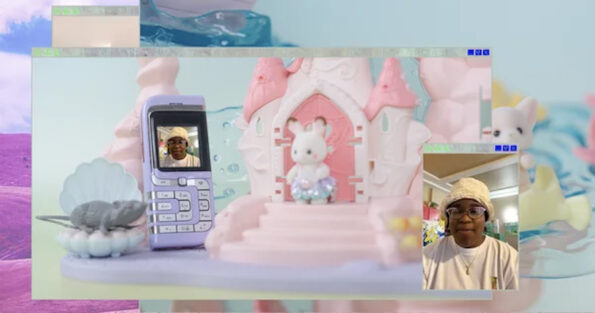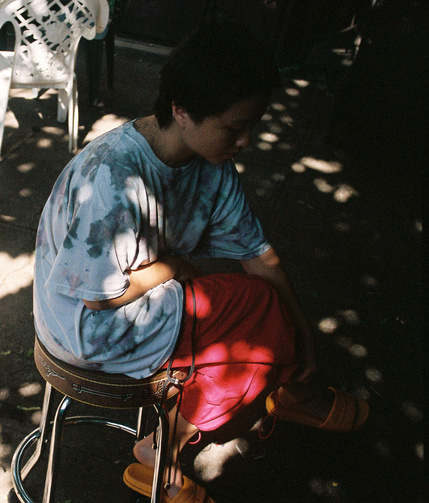Search
To search for an exact match, type the word or phrase you want in quotation marks.
A*DESK has been offering since 2002 contents about criticism and contemporary art. A*DESK has become consolidated thanks to all those who have believed in the project, all those who have followed us, debating, participating and collaborating. Many people have collaborated with A*DESK, and continue to do so. Their efforts, knowledge and belief in the project are what make it grow internationally. At A*DESK we have also generated work for over one hundred professionals in culture, from small collaborations with reviews and classes, to more prolonged and intense collaborations.
At A*DESK we believe in the need for free and universal access to culture and knowledge. We want to carry on being independent, remaining open to more ideas and opinions. If you believe in A*DESK, we need your backing to be able to continue. You can now participate in the project by supporting it. You can choose how much you want to contribute to the project.
You can decide how much you want to bring to the project.

What power does cute hold in today’s world? Its pervasive, adorably sweet facade dominates our online media and social landscape, yet its proximity to capitalist systems leave us suspicious and uncomfortable. This film unpacks the concept of cuteness in contemporary culture through interviews with seven artist whose work and lives interact with cute’s extraordinary and complex power dynamic. Ed Fornieles, Ram Han, Rachel Maclean, Hattie Stewart, Alake Shilling, Chris Zhongtian Yuan and Hello Kitty collector: Amy-Louise Allen, consider how cuteness seeks to enhance, disrupt, and re-imagine the world we live in today.
Cuteness has crept up on us like a tiny kitten waiting to pounce. Our natural attraction to all things adorable may be hardwired into our DNA, but cuteness’ queasy proximity to the values and systems of capitalism makes us view it with deep suspicion. In our rapidly changing and uncertain times, cute entertainment and its sometimes paradoxical nature are beginning to find new agency. Once considered infantile, unserious, and inconsequential, cuteness has been revealed as one of the most influential forces in contemporary culture, and artists can help us understand its unique power.
Chris Zhongtian Yuan: Cuteness often comes with a set of connotations or assumptions.
Rachel McLean: Key objects and images seem like they’re powerless. But they’re actually very powerful.
Ed Fornieles: Cute is always this double-edged sword, and I think that is a very interesting device.
Hattie Stewart: Cute itself is such a big word that can encompass so many things depending on the intention behind it. I think it’s also a big word with a counterbalance—something like “sinister.” If you put “cute” up here and “sinister” here, they’re kind of moving in motion around each other. The furthest thing from “sinister” would be something like Hello Kitty. It would be nostalgia, things that are comforting and non-threatening. But as you get closer to the center, you go into things like “cute aggression,” where the inside doesn’t reflect what the outside is saying. Think of meme culture, like the cute little girl with a burning house behind her. Or other memes I love, like “The horrors are never-ending, yet I remain silly” or “Girlhood is a spectrum,” which play with the idea of sinister and cute. There are so many different ways to think about it.
Alake Shilling: Cuteness is important to me, so I make it an important aesthetic in my work. But there’s a balance. If something is just all saccharine and “too good,” it doesn’t resonate. Even though something is cute, it can still be poisonous.
Rachel McLean: Motherhood has changed my perspective on cuteness a lot. There’s that whole biological aspect of cuteness—I think of cute animals and cute things, for instance. A lot of what we adore seems based on the appearance of a baby, like there’s something biological that draws us to them and makes us adore them. The experience of having a newborn is totally intense, but when you’re only getting two hours of sleep a night, you start to feel like this cuteness is manipulating you. You’re totally exhausted, and you wonder, would I do this if you weren’t so cute? It’s almost like they’re making you do things involuntarily with their cuteness.
Hattie Stewart: When sinister and cute start to roll around each other, that’s when I think cuteness gets weaponized and turns into something like a Trojan horse. An example of that would be the anthropomorphized pill character used to sell Oxycontin in the 90s, which ultimately contributed to the opioid epidemic that killed hundreds of thousands of people—terrifying!
Rachel McLean: Cute objects and images may seem powerless, but they’re actually very powerful. That’s the uncomfortable, often unsettling quality they have. They masquerade as objects we dominate, but they also have power over us.
Ed Fornieles: I’m both sickened by cute and attracted to it. I recognize certain compulsive behaviors in myself—there’s something soothing or comforting about it. There are redeeming aspects to that, but there’s also the danger of tipping into an addictive mode.
Amy-Louise Allen: Amazing, I’m so happy I got this. Hey, I’m Amy, and welcome to my Hello Kitty collection. I’ve been collecting for more years than I can remember. It’s very personal. It’s my life, my safety blanket, something that’s been a constant since I was 11. We go through upheavals in life, moving from partner to partner, house to house, job to job. But for me, Hello Kitty has always been the one rock anchoring me.
Ed Fornieles: I think it’s interesting to analyze the pressures behind cuteness’s popularity. It may be a coping device in response to issues like rising sea levels or global warming. The world is terrifyingly complicated, and cuteness can serve as a comfort blanket.
Hattie Stewart: Having places for escapism is essential when everything feels tragic. It’s where you recharge to do the work needed to improve the world around you, even if it sometimes feels like a hopeless endeavor.
Alake Shilling: I like the idea of taking my time with my work and putting love and care into it. I can’t make ten paintings a month; even though I’d make more money if I could, I see my pieces as precious items. It’s like playing house or creating a baby, and these works are my babies—that’s how I feel about my work. It has to be cute.
Ed Fornieles: My generation is the first where we can expect to have less than our parents. Owning a home or having stable employment is no longer a given. I think cuteness can be seen as a coping mechanism to deal with that powerlessness.
Chris Zhongtian Yuan: Artists aren’t always expected to brave the childishness or naivety within us. But over the years, I’ve delved into themes like childhood and memory, specifically looking back at the 90s when I was a child. Approaching those memories in a cute, surreal way lets me move beyond them, creating new narratives and imaginations.
Rachel McLean: I’m interested in the politics of feminine imagery. When you use pink, glitter, unicorns, or similar visuals, people often dismiss them as frivolous and silly, as they do with female experiences. Instead of rejecting these as problematic, I like to take this imagery and do something interesting with it, something freeing, inventive, and challenging.
Cuteness contains, domesticates, and translates our desires. It is a double-edged sword that can serve as a weapon, shield, or coping mechanism in our increasingly overwhelming and complicated world. Cuteness helps us process the darkness and uncertainty, ultimately providing a path toward a kinder, more favorable future—its power may be more radical than we ever imagined.
“The Power of Cute”, (2024). Commissioned and Produced by Somerset House.
https://channel.somersethouse.org.uk/documentaries-and-films/perspectives/the-power-of-cute
Directed, Filmed & Edited by: Yvonne Zhang (Supported by the Rothschild Foundation)
Producer: Helena Geilinger
Executive Producer: Eleanor Ritter-Scott
Graphics: Lizzie Watts
Featuring Artists: Ed Fornieles, Ram Han, Rachel Maclean, Hattie Stewart, Alake Shilling, Chris Zhongtian Yuan
Hello Kitty Collector: Amy-Louise Allen
Part of the Digital Programme for “Cute: An Exhibition Exploring the Irresistible Force of Cuteness in Contemporary Culture”, at Somerset House, 25 Jan – 14 Apr 2024.
(Featured image: “The Power of Cute”, (2024), filmstill featuring Alake Shilling)

Yvonne E. Zhang is a British-Chinese director and writer based in London. Her narrative short CARRION received the Alfred P. Sloan Foundation Production Grant and has screened at festivals worldwide, winning Best Genre Film at the Tampere Film Festival. Her latest short, SWEETWATER AQUARIUM, executive produced by Caviar, premiered at Vienna Shorts in 2024. Yvonne’s multi-channel film BETTER RAINFALL, created with collaborator Lizzie Watts, was exhibited at CCA Glasgow’s Intermedia Gallery. She holds an MFA in Directing from the American Film Institute and has received fellowships from BAFTA, Fulbright, AFI, AAUW, and P.E.O. International. Currently, she is the Filmmaker-in-Residence at Somerset House, London.
"A desk is a dangerous place from which to watch the world" (John Le Carré)